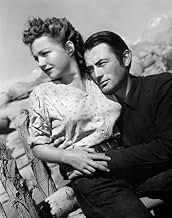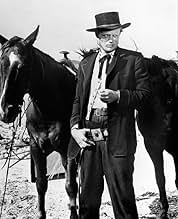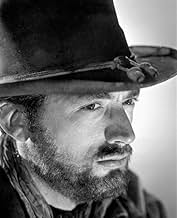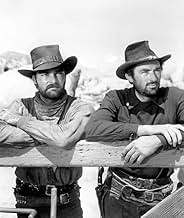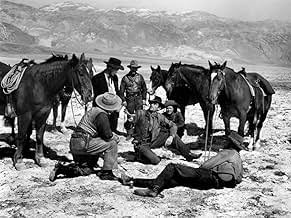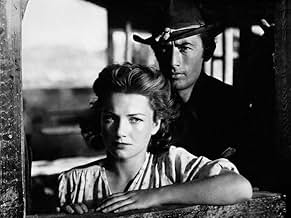IMDb RATING
7.4/10
5.9K
YOUR RATING
A pistol-packing tomboy and her grandfather discover a band of bank robbing bandits taking refuge in the neighboring ghost town.A pistol-packing tomboy and her grandfather discover a band of bank robbing bandits taking refuge in the neighboring ghost town.A pistol-packing tomboy and her grandfather discover a band of bank robbing bandits taking refuge in the neighboring ghost town.
- Awards
- 2 wins
Harry Morgan
- Half Pint
- (as Henry Morgan)
Carlos Acosta
- Indian
- (uncredited)
Robert Adler
- Jed
- (uncredited)
Ray Beltram
- Indian
- (uncredited)
Harry Carter
- Cavalry Lieutenant
- (uncredited)
William Gould
- Banker
- (uncredited)
Eula Guy
- Woman Bank Customer
- (uncredited)
Paul Hurst
- Drunk
- (uncredited)
Victor Kilian
- Bartender
- (uncredited)
Norman Leavitt
- Bank Teller
- (uncredited)
Jay Silverheels
- Indian
- (uncredited)
- Director
- Writers
- All cast & crew
- Production, box office & more at IMDbPro
Storyline
Did you know
- TriviaDuring filming, Gregory Peck broke his ankle in three places after falling from his horse.
- GoofsJust before beginning to cross the salt flats after the bank robbery, Dude pulls his saddle stirrup out to jump into it, but misses. The scene cuts immediately to another view, showing him successfully mounting the horse.
- Quotes
James 'Stretch' Dawson: I ain't talkin to hear my voice. I'm ordering ya.
- Crazy creditsOpening credits prologue: The West - 1867
- ConnectionsFeatured in The Ox-Bow Incident (1942)
Featured review
This fine, moody Western was one of a handful of efforts – heralded, incidentally, by the same director’s THE OX-BOW INCIDENT (1943) – which elevated the form and led the genre into its most popular (and prolific) era.
Superbly shot in crisp black-and-white by Joe MacDonald, the film makes the most of its stark location (Death Valley) and terse plot – following a robbery, a band of outlaws eludes the pursuing posse by crossing the desert and finally hitting the titular ghost town (where the only inhabitants are a grizzled prospector and his tomboyish, gun-toting half-breed niece). The cast is headed by relatively new stars of the era – Gregory Peck (in only his second Western), Anne Baxter (she had just won a Supporting Oscar for THE RAZOR’S EDGE [1946]) and Richard Widmark (this was his first of many genre outings, having only debuted a year previously) – which allowed an agreeably fresh and remarkably mature outlook on familiar themes (a small group of people fighting the elements, and themselves over lust and greed).
Though Widmark is surprisingly off-screen for long periods of time (and, consequently, tends to be overshadowed by his co-stars), this still emerges as perhaps the most satisfying among the Westerns he appeared in. For the record, he would play variations on his role here in both GARDEN OF EVIL (1954) and THE LAW AND JAKE WADE (1958); incidentally, I have two more Westerns of his lined up for this week – the former among them (see below) – as part of my tribute to the recently deceased actor. With YELLOW SKY, Peck followed his roguish turn in DUEL IN THE SUN (1946): the character is eventually revealed to be an upstanding person – an intrinsic part of the star’s on-screen persona, which he could play against effectively but did so only occasionally – forced into a life of crime by circumstances. Naturally, the gang subsequently turns on Peck for not wanting to keep all the gold to themselves – and he holes himself up in Baxter and her grandfather’s house, under siege from his former companions! Baxter, then, has been raised in a tough environment where she can practically overcome any obstacle despite her young age and sex: in fact, even more than the outlaws’ intrusion on the life she knew and the property that was rightfully hers, Baxter fears her personal reaction to them (finding herself especially drawn to Peck, who arouses her dormant feminine instincts!).
The film was adapted by Lamar Trotti (who also produced) from a novel by W.R. Burnett, an author more usually associated with gangster/noir pictures and, in fact, as can also be seen from the colorful character names here – Stretch (Peck), Dude (Widmark), Lengthy (dastardly John Russell), Half-Pint (diminutive Henry Morgan), the youthful Bull-Run, the cheerfully heavy-set Walrus, etc. – the narrative could very easily be tailored to that particular milieu. That said, when it was actually remade – in 1967 under the title THE JACKALS, and atypically featuring horror icon Vincent Price in the role of the prospector (by the way, I’ll be watching this version presently since I came across it as a rental) – it retained the Western ambiance, albeit with a difference (which I’ll discuss in that film’s own review).
At the end of the day, I’d say that YELLOW SKY is pretty much essential fare (beautifully handled by the practiced and versatile Wellman – highlighted by a three-way shoot-out which audaciously takes place in a darkened bar-room, and off-screen to boot!). Even so, the film seems to me to be relatively undervalued within the pantheon of the genre itself: for instance, it doesn’t rate as highly as Peck’s three most prestigious Western titles (the afore-mentioned “super production” DUEL IN THE SUN – elaborate, garish but overpowering, the no less grandiose and star-studded THE BIG COUNTRY [1958], and the intimate but psychologically-dense THE GUNFIGHTER [1950] – of which a second viewing is truly in order!).
Superbly shot in crisp black-and-white by Joe MacDonald, the film makes the most of its stark location (Death Valley) and terse plot – following a robbery, a band of outlaws eludes the pursuing posse by crossing the desert and finally hitting the titular ghost town (where the only inhabitants are a grizzled prospector and his tomboyish, gun-toting half-breed niece). The cast is headed by relatively new stars of the era – Gregory Peck (in only his second Western), Anne Baxter (she had just won a Supporting Oscar for THE RAZOR’S EDGE [1946]) and Richard Widmark (this was his first of many genre outings, having only debuted a year previously) – which allowed an agreeably fresh and remarkably mature outlook on familiar themes (a small group of people fighting the elements, and themselves over lust and greed).
Though Widmark is surprisingly off-screen for long periods of time (and, consequently, tends to be overshadowed by his co-stars), this still emerges as perhaps the most satisfying among the Westerns he appeared in. For the record, he would play variations on his role here in both GARDEN OF EVIL (1954) and THE LAW AND JAKE WADE (1958); incidentally, I have two more Westerns of his lined up for this week – the former among them (see below) – as part of my tribute to the recently deceased actor. With YELLOW SKY, Peck followed his roguish turn in DUEL IN THE SUN (1946): the character is eventually revealed to be an upstanding person – an intrinsic part of the star’s on-screen persona, which he could play against effectively but did so only occasionally – forced into a life of crime by circumstances. Naturally, the gang subsequently turns on Peck for not wanting to keep all the gold to themselves – and he holes himself up in Baxter and her grandfather’s house, under siege from his former companions! Baxter, then, has been raised in a tough environment where she can practically overcome any obstacle despite her young age and sex: in fact, even more than the outlaws’ intrusion on the life she knew and the property that was rightfully hers, Baxter fears her personal reaction to them (finding herself especially drawn to Peck, who arouses her dormant feminine instincts!).
The film was adapted by Lamar Trotti (who also produced) from a novel by W.R. Burnett, an author more usually associated with gangster/noir pictures and, in fact, as can also be seen from the colorful character names here – Stretch (Peck), Dude (Widmark), Lengthy (dastardly John Russell), Half-Pint (diminutive Henry Morgan), the youthful Bull-Run, the cheerfully heavy-set Walrus, etc. – the narrative could very easily be tailored to that particular milieu. That said, when it was actually remade – in 1967 under the title THE JACKALS, and atypically featuring horror icon Vincent Price in the role of the prospector (by the way, I’ll be watching this version presently since I came across it as a rental) – it retained the Western ambiance, albeit with a difference (which I’ll discuss in that film’s own review).
At the end of the day, I’d say that YELLOW SKY is pretty much essential fare (beautifully handled by the practiced and versatile Wellman – highlighted by a three-way shoot-out which audaciously takes place in a darkened bar-room, and off-screen to boot!). Even so, the film seems to me to be relatively undervalued within the pantheon of the genre itself: for instance, it doesn’t rate as highly as Peck’s three most prestigious Western titles (the afore-mentioned “super production” DUEL IN THE SUN – elaborate, garish but overpowering, the no less grandiose and star-studded THE BIG COUNTRY [1958], and the intimate but psychologically-dense THE GUNFIGHTER [1950] – of which a second viewing is truly in order!).
- Bunuel1976
- Apr 22, 2008
- Permalink
- How long is Yellow Sky?Powered by Alexa
Details
Box office
- Gross US & Canada
- $5,600,000
- Runtime1 hour 38 minutes
- Color
- Aspect ratio
- 1.37 : 1
Contribute to this page
Suggest an edit or add missing content




